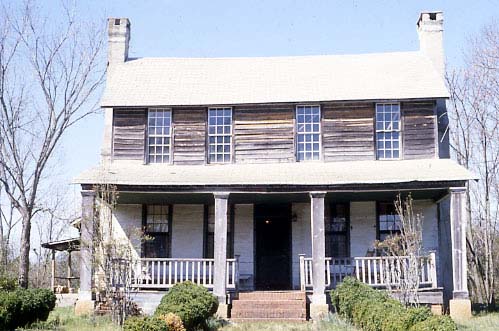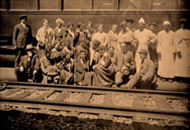“A simple farmhouse using the Carolina Rain Porch to protect the house.”

SCDAH File Photo
City Directories and History: Two story frame residence built circa 1848 by Dr. William Cauthen. Dr. Cauthen was a leader in South Carolina’s Secession movement and a delegate to the state convention in December of 1860.
The Dr. William Columbus Cauthen House was built ca. 1848 for Dr. William Columbus Cauthen and is the oldest known residence in Lancaster County. Located on a flat tract of land in rural Lancaster County, the house is approximately three miles northwest of the town of Kershaw. This two-story, frame, weatherboarded, central-hall farmhouse, or I-House, is in amazingly original form, retaining its pine plank floors, ceilings, and walls. Indoor plumbing has never been introduced into this house, and only minimal electrical wiring has been installed. The only alterations to the house include new roof sheathing and a circa 1865 kitchen addition with two small porches. The Cauthen House possesses a very high degree of integrity of location, design, materials, workmanship, feeling, and association. Outbuildings include a barn of log construction and a barn and shed of frame construction. Dr. William Columbus Cauthen was actively involved in state politics. He was elected and served three terms in the state House of Representatives from 1852-1858. In 1860 he refused a nomination as a delegate to the delegate selection committee for the National Democratic Convention to be held in Charleston, stating that South Carolina should boycott the convention. Later in 1860 Dr. Cauthen accepted the nomination to attend another convention, the Secession Convention in Columbia and Charleston. Cauthen along with two other delegates signed the Ordinance of Secession for Lancaster District. Listed in the National Register June 28, 1982. [Courtesy of the SC Dept. of Archives and History]
Further information: Dr. William Columbus Cauthen was born near Hanging Rock in Lancaster District in 1825. He attended Transylvania College Medical School in Lexington, Kentucky, between 1845 and 1847 and after graduation returned to Lancaster District where he set up an office in a wing of his father’s house. In 1848 Cauthen married his cousin Margaret Jane Cauthen and, according to tradition, built for her this two-story, central-hall farmhouse. In addition to maintaining his medical practice, Dr. Cauthen was active in politics and successfully managed a large farm. Cauthen served three terms in the South Carolina House of Representatives and was one of three delegates from Lancaster District to sign the Ordinance of Secession. In 1859 Cauthen was the recipient of the silver cup award from the Lancaster Agricultural Society for the largest yield of corn from one acre in Lancaster District. Cauthen had contracted tuberculosis early in life and long hard hours of work during the war ruined his health. Tradition holds that Sherman’s army visited the house and dragged the dying doctor out into the yard and beat him in an attempt to discover the hiding place for his food and valuables. Cauthen did not reveal their location, behind a secret panel behind his bed, which is still visible. The soldiers departed without goods and without learning that Cauthen signed the Ordinance of Secession, possibly the reason the house was one of the few in the area not burned. Dr. Cauthen died shortly after this incident.
In 1852 Dr. Cauthen ran for the state house of representatives; he was elected and served three terms from 1852-1858. In 1860 Cauthen, a firm believer in states rights and secession, refused to be nominated as a delegate to the delegate selection committee for the National Democratic Convention to be held in Charleston, stating that South Carolina should boycott the convention. Later in 1860 Dr. Cauthen accepted the nomination to attend another convention, the Secession Convention in Columbia and Charleston. Cauthen along with two other delegates signed the Ordinance of Secession for Lancaster District. NR File Data / SC Dept. of Archives and History
Stay Connected
Explore history, houses, and stories across S.C. Your membership provides you with updates on regional topics, information on historic research, preservation, and monthly feature articles. But remember R&R wants to hear from you and assist in preserving your own family genealogy and memorabilia.
Visit the Southern Queries – Forum to receive assistance in answering questions, discuss genealogy, and enjoy exploring preservation topics with other members. Also listed are several history and genealogical researchers for hire.
User comments welcome — post at the bottom of this page.
Please enjoy this structure and all those listed in Roots and Recall. But remember each is private property. So view them from a distance or from a public area such as the sidewalk or public road.
Do you have information to share and preserve? Family, school, church, or other older photos and stories are welcome. Send them digitally through the “Share Your Story” link, so they too might be posted on Roots and Recall.
Thanks!



